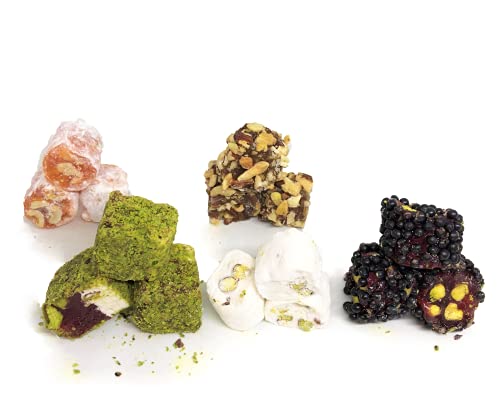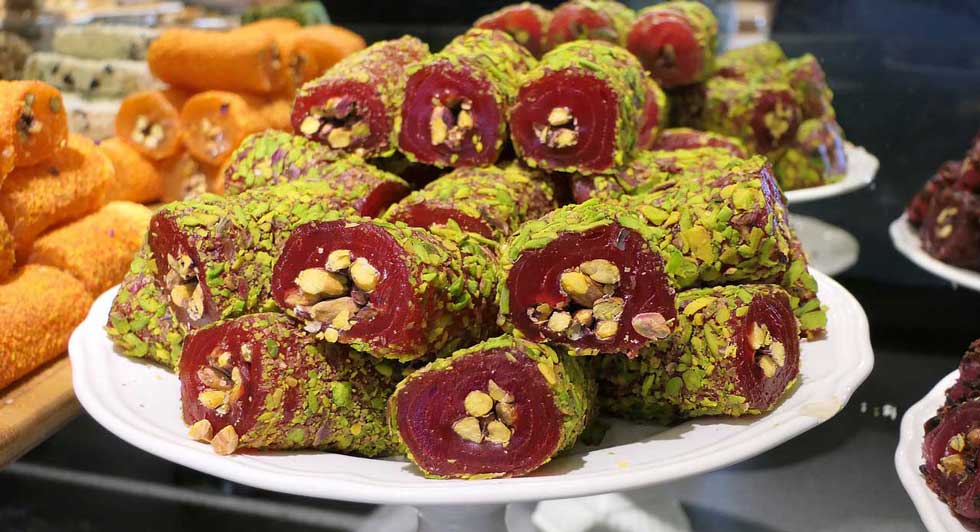Indulge in the soft, chewy bliss of Turkish Delights, or "Lokum" as they are known in their native land. These gelatine-based desserts are dusted with a delicate layer of powdered sugar, offering a delightful sweetness that melts in your mouth.
The flavor options are endless, from classic rose and lemon to more exotic tastes such as pomegranate and mint and spices like cinnamon and clove. And for the daring, there are even modern twists like chocolate-covered Turkish Delights or those infused with tropical fruits such as lychee or mango.
Holding a rich cultural history, Turkish Delights hold a significant place in Turkish society. From weddings to religious celebrations and social gatherings to gift-giving, these sweets are a staple of special moments. Their unique texture sets them apart from other confections, offering a sensory experience that's truly one-of-a-kind.
The Origin of Turkish Delights
Uncharted territories may await me in Turkey and Saudi Arabia, but a warm Serbian welcome had already embraced me. With a generous smile, my host presented me with a charming tray, showcasing the best of Serbian hospitality. A delicate cup of Turkish coffee, steaming with aromatic richness, was accompanied by a sugary cube of "Ratluk", the local name for Turkish Delights, artfully skewered on a toothpick. A clear glass of water completed the offering, refreshing me for the sweet journey ahead.

With one bite of the soft, chewy Ratluk, I was transported to a world of sweetness. The flavors danced on my tongue, an explosion of sugar and spice. I was struck by my host's generosity, which gave me a glimpse into their culture and heritage through this simple treat. I may have yet to visit Turkey and Saudi Arabia, but the warmth of this Serbian moment will stay with me always.
History
Step back in time to the late 18th century and the opulent Ottoman Empire where skilled confectioners sought to delight the royal court with their sweet creations.
Around 500 years ago, a tale was born that would change the world of sweets forever. The Sultan, facing a dilemma with his many mistresses, called upon his skilled confectioners to create a one-of-a-kind dessert. And just like that, the Turkish Delight was born.
To this day, the recipe for this delicious treat has remained virtually unchanged, making it one of the oldest sweets in the world. From its humble beginnings as a solution to Sultan's problem, Turkish Delight has become a beloved treat enjoyed by sweet-toothed people everywhere.
Here is a story we were told: in 1777, a talented candy maker named Bekir Efendi made his way from a small town in eastern Anatolia to Istanbul. According to legend, Bekir was the mastermind behind creating the beloved sweet treat, Turkish Delight. He opened a small shop in the heart of the city and soon became famous for his delicious confections. People in Istanbul had a sweet tooth and couldn't get enough of Bekir's treats. So Turkish Delight became a popular gift, often wrapped in delicate lace handkerchiefs. As the dessert gained popularity as a courting gift, Bekir was appointed the chief confectioner to the Ottoman Court.
Fast forward to the 19th century, a British traveler discovered Turkish Delight on his travels and was immediately smitten. He brought back cases of the sweet treat to Britain and referred to it as "Turkish Delight." And just like that, this delicious dessert made its way to the West and has been a beloved treat ever since.
As their popularity grew, the confectioners never stopped perfecting their recipes. They infused the sweets with the fragrance of rose water and the zing of lemon juice. The rich sweetness of honey balanced the flavors to perfection. And, in a stroke of culinary genius, they added nuts and dried fruits to the mix, creating an array of unique and tantalizing flavor combinations.
From their regal beginnings in the Ottoman court to their worldwide adoration, Turkish Delights, or "Lokum," have captured the hearts and tastebuds of generations. Handcrafted with natural ingredients and traditional preparation techniques, they are a delicious bite of history, a true celebration of cultural heritage.
It is said that the name "Lokum" originates from the Arabic phrase "rahat al-hulkum", meaning "soothing of the throat," and indeed, with every bite, these sweet treats offer a luxurious escape from the mundane.
Fame found Turkish Delights in the pages of Lewis Carroll's "Alice's Adventures in Wonderland," where the hookah-smoking caterpillar presents a box of the sweets, deemed "very good" by the author. More recently, Turkish Delights have graced the silver screen in the 2005 film "The Chronicles of Narnia: The Lion, the Witch, and the Wardrobe." Here, the evil White Witch tempts the young heroes with the sugary delights, a decadent distraction from their quest to save Narnia.
A timeless treat, Turkish Delights continue to evoke a sense of wonder, a taste of adventure, and a soothing of the soul.
Different Recipes Across Countries

Traditional Preparation and Ingredients
Turkish Delights are a type of sweet that has been made for many years using a special recipe. The recipe is passed down from generation to generation of confectioners, each adding its own twist. They are made from sugar, water, cornstarch, or syrup. Ingredients such as rose water and lemon juice are used to create a unique flavor and soft, chewy texture. The mixture is boiled and cooled several times to make sure it is high quality. Some Turkish Delights are still made by hand, giving each one a personal touch.
Each region in Turkey has its twist, like Antep Turkish Delights, which are made with pistachios and have a nutty taste. In Greece, they're called Loukoumi and are similar to traditional Turkish Delights but with honey, cinnamon, and nutmeg for a sweet flavor. During religious holidays like Ramadan, Turkish Delights are a popular treat in the Middle East.

(Luxury Sultan Pistachio-Turkish Delights)
In Europe, they are made with similar ingredients and flavored with fruit juices like raspberry or cherry for a fruity and sweet taste. In Asia, Turkish Delights are made with the same ingredients as traditional ones but flavored with green tea for a delicate flavor.
The Sweet, Plant-Based Goodness of Turkish Delights! Are They Gluten-Free, Halal-Friendly & Vegetarian?
These traditional treats are gluten-free, vegan, and friendly for all dietary preferences, made with only the finest plant-based ingredients. No need to worry about sneaky animal products unless the sweets include gelatin (often derived from animal collagen).
Double-check the label or ask the manufacturer for peace of mind for those with gluten sensitivities or who follow a Halal diet. And for our lovely vegetarians, seek out Turkish Delights made with agar and pectin for a guilt-free indulgence.
Proper storage Techniques
Keep these treats in a cool, dry spot away from those harmful rays of sunshine and any moisture that could dull their flavor and texture.
Tradition calls for storing Turkish Delights in metal containers with snug lids, making it easy to transport and preserve them for extended periods. Another classic approach is wrapping them in wax or parchment paper to protect against moisture and ensure they don't stick together.
It's important to keep in mind that some Turkish Delights may contain nuts or other ingredients that can go bad over time. Always be sure to store them with care and give them a quick check for signs of spoilage before indulging.
Do Turkish delights expire or go bad?
Don't let your beloved Turkish Delights go to waste! Just like any sweet treat, they too have a shelf life that can vary based on factors such as ingredients, storage conditions, and the presence of preservatives.
With proper storage in a cool, dry place away from direct sunlight and moisture, Turkish Delights can last from 6 to 12 months. But beware, warm or humid conditions and exposure to moisture can shorten their shelf life.
Keep an eye out for signs of spoilage, such as a change in color or texture, a suspicious odor, mold, or other growths. If any of these red flags pop up, it's time to say goodbye to those treats.
What Are The Best Turkish Delights?

The best Turkish Delight is subjective and depends on personal taste and preference. However, here are some flavors considered to be among the best.
- Rose-flavored Turkish Delights are a classic flavor many love. They are often made with rose water, which gives them a sweet and floral taste.
- Lemon-flavored Turkish Delights are a tangy and refreshing variation that is perfect for those who prefer a tart taste. They are made with lemon juice and zest, which give them a bright and citrusy flavor.
- Pistachio-flavored Turkish Delights are a nutty and satisfying treat that is perfect for those who love the taste of pistachios. They are often made with crushed pistachios, which give them a crunchy texture and nutty flavor.
- Honey-flavored Turkish Delights are a sweet and sticky treat that is perfect for those who love the taste of honey.
With confectioners reinterpreting classic recipes, nowadays, one can purchase unique and exciting flavor combinations. From chocolate-covered Turkish Delights to those infused with spices like cinnamon and nutmeg, a wide range of options are available for those looking to try something new.
Are Turkish Delights Expensive?
There are two types of Turkish delights, inexpensive and premium, a bit more expensive.
While Turkish Delights are typically affordable sweet treats, the more expensive ones are those with high-quality ingredients and handcrafted production methods. They are often sold in specialty shops and are considered luxury treats, as they are made with rare fruit juices, premium nuts, and exotic spices. They may also be handcrafted and presented in luxurious packaging, contributing to their premium price tag.
For example, Turkish Delights, made with saffron, considered one of the world's most expensive spices, can be more expensive than other variations. In addition, Turkish Delights, made with rare and exotic ingredients, such as pomegranate juice or gold leaf, can also be considered some of the most expensive.
Popular Brands

There are a lot of brands that produce Turkish Delights, both in Turkey and around the world. Our top three list of top brands is from Amazon.com:
Turkish Delight subscriptions?
The rich cultural history and unique flavor combinations of Turkish Delights have been widely celebrated in literature and film, adding to their worldwide appeal. In addition, the alluring soft texture, unparalleled taste, and availability have made Turkish Delights a sweet sensation that's here to stay.
So, as there is a growing trend among those who cherish the classic flavors of Turkish sweets, some Turkish Delights brands have introduced a subscription purchasing option. The subscriptions offer a convenient and effortless way to enjoy indulgent treats every month or bi-monthly. With a range of customizable flavors to choose from, each delivery brings a fresh batch of soft, chewy Turkish Delights straight to your doorstep. No need to navigate crowded markets or search for hidden gem shops, the perfect treat is just a subscription away.
Are you ready to sink your teeth into Turkish tradition's rich, syrupy delight with a monthly Turkish Delight subscription?

